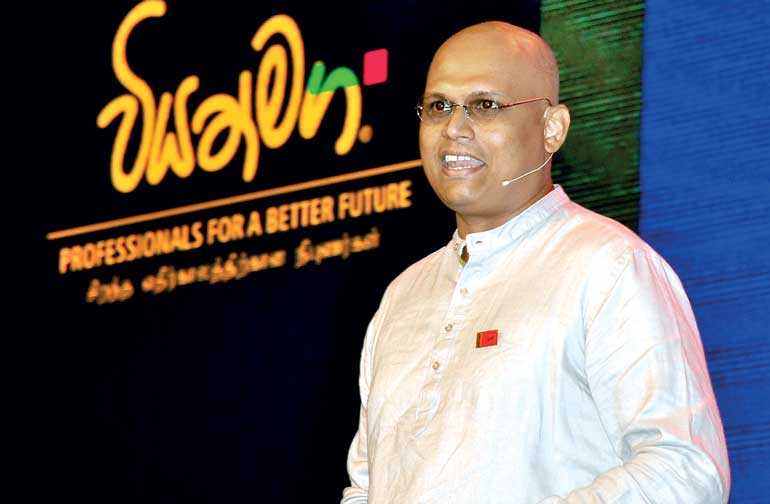Wednesday Mar 04, 2026
Wednesday Mar 04, 2026
Thursday, 7 June 2018 00:00 - - {{hitsCtrl.values.hits}}

Eranda Ginige addressing the Viyathmaga 2018 Annual Convention – Pic by Lasantha Kumara
Why didn’t we become a developed nation in the 35 years between the end of the World War II and the start of our internal war? Why are we not developed after 40 years since the introduction of the open economy against national economic policies? Why are we fluctuating in a narrow band across the global development indices even after ending the war on terrorism and rapidly commencing mega development projects? Why is our country still not developed?
According to traditional economic theories, for a country to develop it must continuously industrialise. Which means we must exponentially produce products and services; sell them inside and outside the country on open and competitive market to earn wealth; which will then be distributed among all citizens to satisfy their needs; and thereby creating a “developed” country where all citizens live happily ever after. That is the development model which started in the 19th century and ended in the 20th century. But friends I ask you, is that development model practical? For three reasons I say it is not.
The zero-sum game
Firstly, let’s imagine when we wake up tomorrow, all the developing nations have become developed nations like for example the United States of America. To supply the needs of the humans of such a developed world, the resources of one planet is not enough. We would need more than four and a half Earths for all of us to live the “developed” lifestyles of the developed nations. Simply put, the traditional development model is unscientific.
It’s a zero-sum game. For those few developed nations to maintain their high development standards, majority of the countries must remain un-developed forever.
Development myths
Secondly, the countries we call “developed” are not really developed. They haven’t solved all their problems. They too have growing numbers of poor people. They too have unemployed youth. They too have worsening problems in education and health. They too have religious and racial based terrorist attacks as we speak. They too have financial fraud, corruption and crimes. Their soil, water and air are irrecoverably polluted. Their political systems are crumbling.
Therefore, even if we somehow beat the other developing nations and become a developed nation, all our problems are not going to be resolved. Instead we will face a new set of social, environmental, economic and political problems which are far more complex than now.
Unfair development
Thirdly, if we honestly ask ourselves, “do we really need a development like that of the United States of America or the United Kingdom or Japan or Russia or Singapore?” – is that the real development aspiration of the majority of ordinary citizens of our country? As a country which has a written history of 2,600 years and as a country which has been evolved from a civilisation dating back several millennia more, how can our development vision be the same with that of the countries which has a history of some few hundred years?
Maybe we already built our mega cities during the Anuradhapura Kingdom. We have passed that development and had come a long journey. We simply cannot, and we must not turn back that social-cultural-philosophical evolution of our nation. What we are really doing here is chasing the impractical dream which is cleverly sold to us by the old and new super powers. A desperate attempt by the urban few to make up for their inferiority complex by fooling ourselves in a development which does not fit us.
Instead I propose a new development vision which is suitable to our land, our climate, our natural resources; and fulfils the real needs of the vast majority of our ordinary citizens. A development model which recognises our strengths and understands our weaknesses. A new development “Way” which will enable us to face the coming Asian and global challenges of the future. That new development must be designed by us and us alone. That is the social innovation need of the moment. How do we do that social innovation? Let’s start from the basics.
Sinhala, Tamil, Muslim, Malay, Burgher all of us have only one resource. And that is this land we call Sri Lanka with all its living and non-living things. The only foundation, the definitive purpose and the eternal principle of our new development must be “to preserve that resource for the Sinhala, Tamil, Muslim, Malay, Burgher children of the future, and their children and theirs, even better than what it is of today”. Let me give a vision of such a development using three examples.
Food production for the 21st century
Between the years of 2030 and 2050, our population would be around 25 million. However, the global population would have increased beyond an unbearable nine billion humans. And in that future, India, Pakistan and Bangladesh our closest neighbours would be among the top 10 populous countries, with China and Africa on either side of us.
That massive population will need a massive food supply. The global food production will continue to face increasing pressure due to the effects of climate change which ironically is caused by the very development we are chasing. In such an intensive future, depending on food imports and food aid, is putting our future generations in stark danger.
Now whether that happens or not, there is still nothing wrong in providing our future generations with poison-free, uncontaminated, nutritious foods at an affordable price. Therefore, what if we can make our future generations self-sustainable in food?
What if we can transform our food production system to meet the 21st century demands? Without discounting our 6,000 years of perfection in plant technology and using modern technology to improve it, what if we can build new social enterprises in food production? In addition to rural farming, what if we can build social enterprises in organic farming, urban farming, indoor farming, precision farming? What if we can prevent the wastage in our food production chains and instead add value to export the excess? And what if we can change the wasteful food consumption patterns of our people? That’s the future of business. That’s social innovation.
Clean energy for all
Our future generations will have to face the fossil fuel crisis in the post 2035 world. The end of the use of fossil fuels will certainly happen within this century. Which is why the countries that possess those resources are urgently and massively investing in renewable energy such as solar and wind power. As soon as they are self-sufficient in renewable energy, they will stop using fossil fuels and save the remaining resources to their future generations to be used in case of a catastrophic emergency.
Whether it happens or not, still there is nothing wrong in providing our future citizens with clean, efficient and long-term sources of energy to carry out their daily work, production and business. Therefore, what if we can become a 100% renewable energy country before the year 2035?
An equatorial island with the ocean all around us and with a small population can very well do this. What if we can build new social enterprises that manufacture and service, products in renewable energy? What if we can build social enterprises in architecture and construction which will design and build houses, offices and buildings that will meet the climatic and energy conditions of the future? What if we can change the energy wasteful business processes and lifestyle of our people? That’s social innovation.
Healthy in mind, body and spirit
In the next 30-50 years the human population could very well be dangerously decreased as well. But it’s not for any good reason because the most probable cause for that decline is Antibiotic Resistance (AR). Many disease-causing microorganisms have already evolved to resist the antibiotics due to their excessive and irresponsible use. For a country with a small population like ours, such an uncontrollable epidemic could cause unimaginable damage to our society, economy and the environment.
Whether that happens or not, still there is nothing wrong in making our future generations healthy and strong in mind, body and spirit. In a future where the cost of imported medicine, consultation fees and hospital charges will be unbearable, what if we can develop our indigenous “Hela-Paramparika” medical social enterprises and make it competitive with the western and ayurvedic systems? Instead of healing after the disease was acquired, what if we can train our people to stay healthy? That is social innovation.
These are but a few examples of social innovations which we must realise for our future. Similarly, other critical social, environmental, economic and political aspects should be innovated. Importantly, all examples above will create hundreds and thousands of new jobs. In a future where technologies such as Artificial Intelligence, Automation and Blockchain will make white-collar jobs and government jobs obsolete, what if we can create modern employment sectors in modern food production, modern eco-friendly production and a thriving social enterprise sector? That is social innovation.
The next curve of human civilisation
This is the social-economic-political model of the near future. This is the next level of human civilisation. Most of our policy makers and business leaders are still stuck in the lost 30-40 years of now obsolete development model. I don’t blame them because some of them were successful in that model. It’s the only model they know.
But we now have the development model of the 21st century which will define the fate of Earth and everything in it in the 22nd century and beyond. We must decide now whether we are going to follow the old, unsuccessful, destructive development model or are we going to start the new futuristic development today? I say we start the new development, my friends.
The rise of the Millennials
But to do that we must give the opportunity today for the leaders of tomorrow. The millennial generation born in the 1980s and 90s are ready to take the leadership in business and in politics, in the next 10 to 20 years. We are the generation that has to face the consequences of the destruction caused to the society, environment, economy and democracy in the last 100 years in the name of development.
Therefore, we the millennials are more sensitive to those problems, more insightful about those problems, and are more capable of social innovations to solve those problems. Thus, the millennials have a far greater responsibility to release our nation’s development from the 20th century and transform it to the 21st century realities. And in that journey, we do not want to be another Singapore, another Beijing, another London or another New York. We must be the unique Sri Lanka which we are.
To design the future of a country, we who live today must make great sacrifices. Just as our ancient ancestors and the war heroes of recent past sacrificed their lives and limbs so that we can live in peace in this land. To develop our country, we need all people who love our country, its soil, its fragrance, its people, its forests, its animals to come together as one and work together as one. If we don’t do that today my friends, when will we do it? If we don’t do it ourselves my friends, who else will do it?